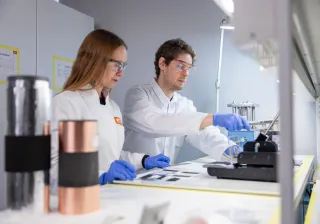Dr Nesli Sözer has been appointed as Research Professor in Smart and Sustainable Food Production at VTT with effect from 1 February 2019.
Nesli Sözer has been working as a principal scientist at VTT focusing on food material science, ingredient and food product design. Currently, she is responsible for the agile food processing theme at VTT, and contributes by integrating agile manufacturing technologies to support personalised food production.
Sözer will be responsible for creating scientific and technological excellence in the field of food production undergoing transformation. The focus of the work is technologies and processing for sustainable and healthy ingredients and foods.
"The 4th industrial revolution fuses various technologies to unite the physical, digital and biological spheres. In the new food economy, personalization of food products will make a seismic shift in the manufacturing and retail sectors, and we are already feeling the shocks. Agile manufacturing technologies will reduce waste during food manufacturing due to on-demand production. My duty in the new position is to provide technological solutions to the industrial and societal challenges", comments Sözer her new role.
"Food is one of our basic needs, but also increasingly a subject to personal choices. In addition to quality, safety and easy access of food, consumers are also interested in health issues and the environmental burden of the food production. The food chain has to meet these new demands. At VTT, we have envisioned possible change paths towards new food industry. As our new research professor Nesli Sözer will be one of our key persons with a multidisciplinary approach in implementing the new Food Economy 4.0 vision with our partners", says Tiina Nakari-Setälä, Vice President in research at VTT.
VTT's Food Economy 4.0 vision roadmap deals with the 4th revolution underway in food production. The current agriculture and mass production of food are challenged by megatrends such as globalization, digitalization and climate change. Trends specific to the food system, such as health, personalization, convenience, pleasure-seeking, transparency, sustainable production and safety also need to be addressed.




